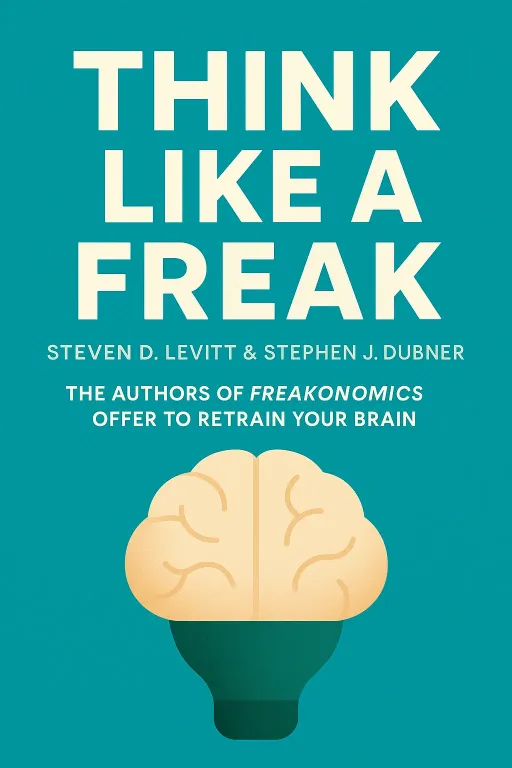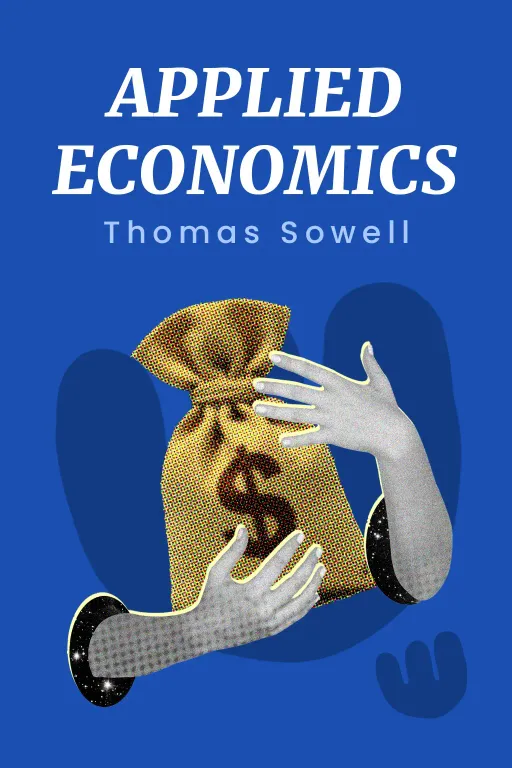
Think Like a Freak
11 minThe Authors of Freakonomics Offer to Retrain Your Brain
Introduction
Narrator: What could a free blog possibly have in common with a bottle of Poland Spring water? For years, authors Steven D. Levitt and Stephen J. Dubner ran their popular Freakonomics blog, a space for casual, opinionated, and data-driven explorations of everyday life. They loved the interaction with their curious readers, but the idea of compiling those free posts into a book seemed absurd. Who would pay for something they could get for free? The answer came to Dubner while passing a massive water-bottling plant in Maine. He realized that people happily pay for bottled water, a product that flows freely from the tap. The value wasn't in the water itself, but in the convenient, curated, and reliable packaging. This epiphany became the central idea behind their book, Think Like a Freak: The Authors of Freakonomics Offer to Retrain Your Brain. In it, they "bottle" their most insightful blog posts, offering a blueprint for a new way of thinking—one that looks past conventional wisdom to see the hidden incentives and surprising truths that shape our world.
The Bottled Water Principle: Repackaging Free Ideas for Value
Key Insight 1
Narrator: The genesis of Think Like a Freak is a lesson in value perception. After the success of their first book, Levitt and Dubner launched the Freakonomics blog as a more informal outlet. It became a "happy home" for their writing, a place to test wild ideas, ask provocative questions, and engage with a vibrant community of readers. The blog wasn't a direct revenue generator, but they kept it going for a simple reason: they loved their readers' curiosity and ingenuity.
When their publisher suggested turning the blog posts into a book, the authors initially balked. It felt like cheating to charge for content that was already freely available online. The turning point was Dubner's "bottled water epiphany." He saw the Poland Spring plant and realized the company’s genius was not in creating water, but in packaging it. They took a free resource, put it in a convenient bottle, and sold it for a premium. Levitt and Dubner decided to do the same with their ideas. They sifted through thousands of blog posts, selecting the best, editing and updating them, and organizing them into a cohesive, curated experience. The book, therefore, isn't just a collection of old posts; it's a refined and "bottled" version of their best thinking, demonstrating that value can be created not just through invention, but through curation, packaging, and a deep understanding of what an audience truly wants.
Challenging Sacred Cows: Why We Should Pay Politicians More
Key Insight 2
Narrator: A core tenet of thinking like a freak is the willingness to question deeply held beliefs and propose solutions that sound crazy at first. The authors use their blog as a testing ground for such ideas, wading into controversial topics like terrorism, air travel, and political reform. One of the most provocative ideas explored is how to improve the quality of our politicians. The authors argue that the current system is set up with poor incentives. Low pay and immense public scrutiny deter many highly qualified individuals from entering public service, while the rewards for good governance are abstract and long-term.
To illustrate a different approach, they point to data from Singapore, where government ministers are among the highest-paid in the world, with the Prime Minister earning multiples of the U.S. President's salary. The rationale is that high salaries attract top-tier talent and reduce the temptation for corruption. Research from Brazil and Mexico further supports this, showing that higher wages for municipal politicians led to a more competitive field of candidates with better education and experience. Levitt even floated the idea of giving politicians the equivalent of stock options in the legislation they produce—a huge cash payout years later if their policies demonstrably improved public health or education. When he proposed this to Senator John McCain, the idea was swiftly rejected. Yet, the rejection itself was telling. It highlighted the immense cultural resistance to treating governance like a results-oriented business, even if the current model fails to align the interests of politicians with the interests of society.
The Anatomy of Fear: Why We Misjudge Risk and Ignore Data
Key Insight 3
Narrator: Humans are notoriously bad at assessing risk. We fear the rare and dramatic—like shark attacks or plane crashes—while ignoring the common and mundane dangers that are far more likely to harm us. The authors argue this is because our brains are wired for stories, not statistics, and the media amplifies this bias. This leads to what they call "security theater," where we implement measures that feel safe but do little to reduce actual risk.
A powerful example of this irrationality is the public and official reaction to Levitt's research on child car seats. Using years of U.S. crash data, Levitt found that for children aged two and older, a standard seat belt was just as effective as a bulky, expensive car seat in preventing death or serious injury in an accident. The finding did not suggest that restraints were unnecessary, only that the specific type of restraint didn't matter for that age group. When he published the findings, the reaction was not one of scientific curiosity but of outrage. The U.S. Secretary of Transportation at the time, Ray LaHood, publicly dismissed the research as an attempt to "be provocative," stating that as a grandfather, he didn't have the "luxury" of questioning the conventional wisdom. This response demonstrates a profound resistance to data that conflicts with our emotional beliefs. We are so invested in the idea that car seats are superior that we refuse to even consider evidence to the contrary, perfectly illustrating our tendency to let fear, rather than facts, guide our decisions.
The Power of Incentives: How Cheating Reveals the Way the World Really Works
Key Insight 4
Narrator: According to Levitt and Dubner, if you want to understand how a system truly works, look at how people cheat it. Cheating is a primordial economic act: getting more for less. It reveals the true incentives at play, not the ones we publicly claim to value. People's behavior, whether honest or dishonest, is almost always a rational response to the incentives they face.
A brilliant illustration of this comes from the commuter train system in Mumbai, India. With six million daily passengers, it's impossible for ticket agents to check everyone. As a result, many people travel without a ticket. The risk is a hefty fine if caught. However, a clever entrepreneur created an "insurance" scheme for these ticketless travelers. For a small monthly fee, members join an organization. If a member is caught and fined, the organization reimburses them 100% of the fine. This system brilliantly alters the incentives. It removes the financial risk of cheating, making ticketless travel a far more rational economic choice. This story isn't just about cheating; it's a microcosm of economics in action. It shows how people creatively respond to rules, risks, and rewards to maximize their own benefit, offering a clearer picture of human motivation than any official rulebook ever could.
Eco-nomics: Uncovering the True Environmental Cost of Our Choices
Key Insight 5
Narrator: Just as with safety, our intuition about what’s good for the planet is often wrong. We gravitate toward solutions that are visible and feel virtuous, without analyzing the data behind them. A prime example is the locavore movement—the push to eat food grown locally to reduce "food miles" and carbon emissions from transportation. It seems like an obvious environmental win. However, the authors present research that dismantles this idea.
A study from Carnegie Mellon University found that transportation accounts for only 11% of the greenhouse gas emissions in the U.S. food system. A staggering 83% comes from the production phase itself. This means what you eat is far more important than where it came from. The production of red meat, for instance, is about 150% more greenhouse-gas-intensive than chicken or fish. Another study concluded that adopting a completely vegan diet is seven times more effective at reducing emissions than eating an all-local, meat-based diet. This data-driven perspective shows that giving up red meat for one day a week has a greater positive impact than eating an entirely local diet. This is a classic Freakonomics insight: the popular, feel-good solution (eating local) is often less effective than the more difficult, less visible one (changing your diet).
Conclusion
Narrator: The single most important takeaway from Think Like a Freak is that morality and economics are two different things. Morality, the authors state, represents the way we'd like the world to work, while economics describes how it actually works. To truly understand the world, we must be willing to set aside our preconceived notions of how things should be and instead look for the hidden incentives, the counterintuitive data, and the subtle biases that shape human behavior.
This book challenges you to retrain your brain, to move beyond surface-level explanations and ask the uncomfortable questions. It’s a call to think smaller, to appreciate the nuance of a problem, and to not be afraid of saying "I don't know." So, what is one belief you hold—about politics, health, or your own life—that you've never truly questioned? Perhaps it's time to start thinking like a freak and see what you might discover.









